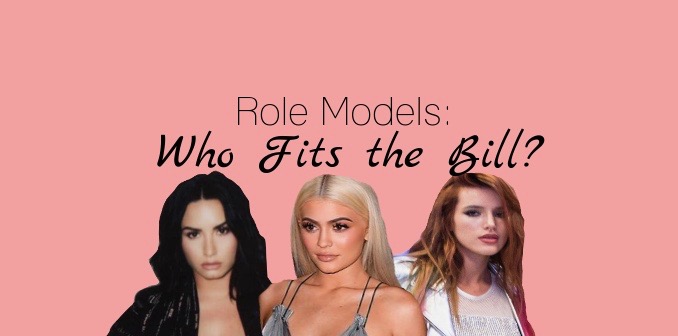Role Models: Who Fits the Bill? (EDITORIAL)
August 22, 2018
Photo Credit: Juliana Ferrie/Achona Online
Celebrities Demi Lovato and Bella Thorne both started their careers on Disney Channel.
As young women finding our paths in life, role models play a major part in our development as people. Oftentimes, we look up to others in order to determine our goals in life, as well as the way we wish to portray ourselves. Due to the constant presence of the media, we typically idealize the accomplishments of celebrities and public figures. However, in our world of vices and temptations, determining a role model can be harder than it used to be.
Specifically, throughout the United States, the recent opioid crisis has had a major effect not only on the lives of everyday people, but also the celebrities who are supposedly our role models. The double standards surrounding drug usage place unhealthy ideas in the minds of developing teens.
For example, Demi Lovato’s recent overdose sheds a new light on the presence of double standards in the media. Before her relapse occurred, Lovato’s lifelong struggle with addiction inspired her to openly speak out about her disease to increase awareness. She directly addresses these issues in her documentary “Simply Complicated.”
Lovato’s fans, as well as fellow celebrities, reacted to her overdose by sending their love and support through various social media platforms, especially Twitter. Fans praised Lovato’s strength and determination as she recovered.
Olivia Martinez (‘21) said, “Just because someone made a bad decision in the past does not mean that they are a bad person. Although Demi Lovato’s overdose was bad, she did have an existing problem with drugs. She was trying to get help to get out of her situation and to be a better role model for those who look up to her. It just depends on the person.”
I would love to say a giant happy birthday to @ddlovato. You were one of my first concerts. You get me through some of my toughest times. Sending lots of love and prayers as you recover. Can’t wait to see you back in action. pic.twitter.com/c7maM4vcY3
— Shatonna (@Shatonna3) August 21, 2018
The support Lovato received after her overdose contrasts greatly to the response other celebrity figures received after going through similar circumstances. For instance, in December 2017, the overdose of rapper Lil Peep drew sharp criticisms from social media users, as well as the media, who claimed that the rapper deserved his death.
Katie Jones (‘19) said, “People portray rappers as being a part of gangs and breaking the law. People expect rappers to be involved in drugs and other illegal activities. Demi Lovato, on the other hand, is a rule follower in the eyes of the media, so when she makes a mistake, she is praised by her fans.”
Funny how Lil Peep “deserved to die” because he was a junkie but it’s nothing but love & support when Demi Lovato OD’s on heroin ? .. twitter is something else
— ❕ (@bkxnz) July 25, 2018
The unequal standards the media holds celebrities to present a valid question about how their behavior should be perceived. In Lovato’s case, she should not be shamed for her struggle, but should she be idolized as the role model social media makes her out to be?
In short, no. Although she has always been someone that those struggling with similar circumstances could look up to, Lovato represents a world that lacks consequences; a representation that is very misleading for the teenagers who revere her. Not everyone lives in the world Lovato does: where narcan, a nasal spray that can reverse an opioid overdose, is kept on hand, and where your first overdose may not be your last. Realistically, this is not the case for everyone, and because of that, adults and teenagers die.
Lovato’s actions are not the only ones that must be taken into account. The behaviors displayed by other celebrities, such as Bella Thorne and the Kardashians, convey a similar disconnect from the real world. The wild behavior of Bella Thorne, for example, endorses the use of this behavior in order to gain publicity. In addition, the Kardashians promote distorted ideals surrounding body image, which can severely affect the confidence of teenagers and women. Their use of artificial methods, such as botox, in order to maintain and enhance their looks provide teenage girls with an image of what they “should look like” that is not only deceitful, but also unrealistic.
Vent session: @KimKardashian’s insta story has @KendallJenner asking Kim if she is eating. And then applauds her because she looks so skinny.
Ahem, little children follow your account. Stop promoting unhealthy body image and eating habits for young girls ??— Mikayla (@Mikayla_Jo28) July 29, 2018
When determining our role models, we must be able to find positive examples in a world full of negative ones. All humans have their flaws, but role models are people who learn from their mistakes instead of repeating them. Although some celebrities and other figures cannot be deemed role models, we can idolize certain qualities of these figures in order to create the image we desire for ourselves overall.
Erin Hendrickson (‘22) said, “To me, a role model is someone who helps people and shows us who we should be.”


Isabella Ferrie • Aug 22, 2018 at 6:02 pm
Great article, Jules! These celebrities are not to be considered role models. A role model is not someone who is unhappy in their own skin, and relies on drugs and surgery to fix it.
Pauline • Aug 22, 2018 at 12:49 pm
Well written article. I agree that in and out of rehab every 6 months is not even close to being a role model. A role model should be held to a much higher standard.
Kristy • Aug 22, 2018 at 4:32 pm
Agreed???? Great article, well said!